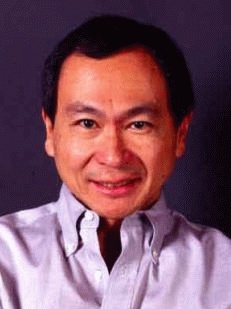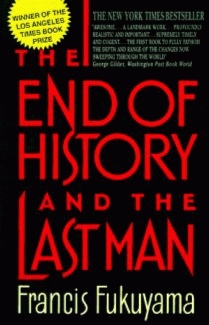

Francis Fukuyama
US-amerikanischer Politologe, Politikberater, Vertreter des Liberalismus, Theoretiker des Endism
* 27.10.1952 in Chicago, USA
Werdegang
Studium an der Cornell Universität (B.A.) und in Harvard (Ph.D. in Politikwissenschaft)
1979-1980; 1983-1989; 1995-1996: Mitarbeiter der Abteilung für Politikwissenschaft bei der RAND Corporation
1981-1982;
1989: Mitarbeiter des amerikanischen Außenministeriums, zunächst
spezialisiert auf den Nahen Osten, später politisch-militärische
Angelegenheiten Europas
1996-2000: Omer L. and Nancy Hirst Professor
of Public Policy an der School of Public Policy an der George Mason
University in Virginia
seit 2000: Bernard L. Schwartz Professor of
International Political Economy und Director of the International
Development Program an der Paul H. Nitze School of Advanced
International Studies an der Johns Hopkins University in Washington,
D.C.
Mitgliedschaften
2001-2005: Mitglied der Bioethik-Kommission der Bush-Administration
Beiratssmitglied des National Endowment for Democracy (NED), des Journal of Democracy, und der The New America Foundation
Auszeichnungen
Ehrendoktortitel des Connecticut College in New London, Connecticut und des Doane College in Crete, Nebraska
Bücher:
The
End of History and the Last Man. New York: Free Press 1992. (dt. Das
Ende der Geschichte: Wo stehen wir? München: Kindler 1992.)
Trust:
The Social Virtues and the Creation of Prosperity. Free Press 1995.
(dt. Konfuzius und Marktwirtschaft. Der Konflikt der Kulturen. München:
Kindler 1995.)
The Great Disruption: Human Nature and the
Reconstitution of Social Order. New York: Free Press 1999. (dt.: Der Aufbruch.
Wie unsere Gesellschaft eine neue Ordnung erfindet. Wien: Zsolnay 2000.)
Our
Posthuman Future: Consequences of the Biotechnology Revolution. New York: Farrar,
Straus and Giroux 2002. (dt. Das Ende des Menschen. Darmstadt: Wiss.
Buchges. 2002.)
State-Building: Governance and World Order in
the 21st Century. Ithaca: Cornell University Press 2004. (dt. Staaten bauen.
Die neue Herausforderung internationaler Politik. Berlin: Propyläen
2004.)
America at the Crossroads: Democracy, Power, and the Neoconservative Legacy. New Haven: Yale University Press 2006. (dt.: Scheitert Amerika? Supermacht am Scheideweg. Berlin: Propyläen 2006.)
After the Neo Cons: Where the Right went Wrong. London: Profile Books 2006.
Nation-Building: Beyond Afghanistan and Iraq. Baltimore: John Hopkins University Press 2006.
The End of History? In: The National Interest. Summer 1989. S. 3-18.
The „End of History?". Debate: A Response to My Critics. In: The National Interest 18. Winter 1989/90.
Has
History Restarted Since September 11? (The Nineteenth Annual John
Bonython Lecture.) Centre for Independent Studies Occasional Paper no.
81. August 2002.
The Neoconservative Moment. In: The National Interest 76. Summer 2004. (online)
The Imperative of State-Building. In: Journal of Democracy 15.2004, 2. S. 17-31.
Stateness First. In: Journal of Democracy 16.2005, 1. S. 84-88.
Why shouldn't I change my mind? In: Los Angeles Times, April 2006. (online)
Liberalism versus State Building. In: Journal of Democracy 18.2007, 3. S. 10-13.
Huntingon, Samuel: No Exit. The Errors of Entism. In: The National Interest. Fall 1989. S. 3-11.
Peet, Richard: Reading Fukuyama: politics at the end of history. In: Political geography debates No. 4: Reading Fukuyama. Worcester: Butterworth 1993. S. 64-78.
Burns, Timothy (Hrsg.): After History: Francis Fukuyama and His Critics. Lunham, M.C.: Rowman & Littlefield 1994.
Griffiths, Martin: Fifty Key Thinkers in Internatiuonal Relations. London: Routledge 1999. S. 68-75.
SG